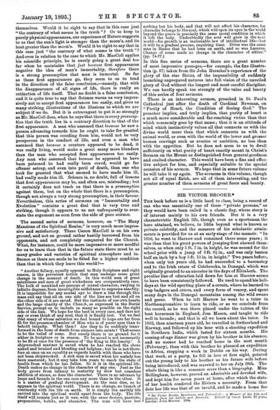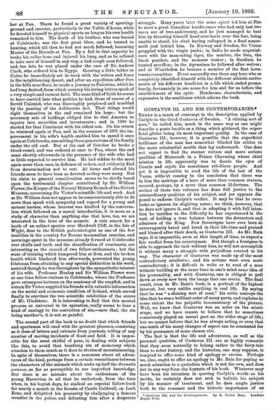SIR VICTOR BROOKE.*
THE book before us is a little hard to class, being a record of one who was essentially one of those "private persons," as they would have been called in a classic day, whose story is of interest mainly to his own friends. But it is a very characteristic English life, though even as a sportsman the hero attained, we believe, to little beyond what is known as private celebrity, and the measure of his scholastic attain- ments is provided for us at an early stage of the memoir. "In 1856, he went to Harrow and remained there some years ; it was then that his great powers of jumping first showed them- selves, as when only 5 ft. 7 in. in height, he was second for the school prize with a jump of 5 ft. 6i in., and was only beaten half an inch by a boy 5 ft. 10 in. in height." Two years before, when only ten years old, he had succeeded to a baronetcy and to the Irish estate of Colebrooke, in Donegal, which was originally granted to an ancestor in the days of Elizabeth. The peculiar line of education laid down for him at Harrow seems to have been consistently followed. He used to spend his holi- days at the wild sporting place of a cousin, where he learned to trap badgers and otters, and every form of venery, and spent many days in the Donegal mountains among the wild swans and geese. When he left Harrow he went to a tutor in Northamptonshire to learn to ride, or so we conclude from the record, as he was there placed under the tuition of the best horseman in England, Jem Mason, and taught to ride well to hounds ; and that is all we learn about the tutor. In 1862, then nineteen years old, he travelled in Switzerland and Norway, and followed up his tour with a shooting expedition in Southern India, which lasted for sixteen months. His coming-of-age dinner was given by his brother in his absence, and no sooner had he reached home in the next month (February), than with this brother he planned an expedition to Africa, stopping a week in Dublin on his way. During that week, at a party, he fell in love at first sight, pointed out the young lady to his brother as his future wife before being introduced, and was married to her on July 28th. The whole thing is like a romance more than a biography. Miss Bellingham, however, proved an admirable and devoted wife, and kept him for seven years at home, after which the state of her health rendered the Riviera a necessity. From that date her life was that of an invalid, and he made a home for • Sir Victor Brooke, Sportsman and Naturalist : a Memoir of his Lip and. Extracts from his Letters and Journals. Edited by Osesr Leslie St phew. London: john Murray. 1E94. her at Pan. There he found a great variety of sporting. ground and exercise, particularly in the Val14e d'Arras, while he devoted himself to physical sports as long as his own health remained to him. The death of his brother, who was buried at Colebrooke, was the first great blow, and he turned to hunting, which till then he had not much followed, becoming Master of the Hounds at Pan. By a fall in that capacity he broke his collar:bone and injured his lung, and as he refused to take care of himself in any way, a bad cough soon followed, and, too late, he was placed under the care of Sir Andrew Clark, who ordered him to Egypt. Growing a little better at Cairo, he immediately set to work with the wolves and foxes in the neighbouring desert, and after an expedition after ibex in the hills near Suez, he made a journey to Palestine, which he had long desired, from which country his loving letters speak of a very simple and earnest faith. The same kind of faith he seems to have carried into what politics he had, those of course of a fervid Unionist, who was thoroughly perplexed and troubled by the passing of the Ashbourne Act. That things would right themselves in the end remained his hope ; but the necessary sale of holdings obliged him to visit America to inquire into securities and investments ; and in 1890 he started for that Continent with his eldest son. On his return he wintered again at Pan, and in the summer of 1891 the im- provement in his wife's health enabled him to spend it once again at Colebrooke, assembling three generations of the family under the old roof. But at the end of October he broke a blood-vessel, and was ordered at once to Pan, where the end name shortly afterwards in the presence of the wife who had so little expected to survive him. He had ridden to the meet again more than once, in defiance of orders, and evidently died from determination not to rest. At home and abroad his friends seem to have been as devoted as they were many. But his claim to general consideration seems to be chiefly based upon the testimonial chapter contributed by Sir William Flower, the Keeper of the Natural History Branch of the British Museum, concerning Sir Victor's scientific life and work. And as Sir William does not appear to be conscientiously able to do more than speak with sympathy and regard for a young and earnest learner, whose interest was kindled by the conversa- tion which followed on a casual introduction, it is more as a study of character than anything else that here, too, we are interested in the hero of the memoir. A vain search for a tooth of an extinct species over Hordwell Cliff, in the Isle of Wight, dear to the British palmontologist as one of the few localities in the country for Eocene mammalian remains, and mornings spent in the museum already formed at Colebrooke 3ver skulls and teeth and the classification of ruminants, are interesting as the record of two fellow-enthusiasts; but the want of training which hampered him at first, and the broken health which hindered him afterwards, prevented the young Irishman from attaining to any special distinction in his work, assisted though he was throughout by the sympathetic interest of his wife. Professor Huxley and Sir William Flower were at one time fellow-visitors to Colebrooke, where the Professor gave extempore lectures on the anatomy of the crayfish, and in return Sir Victor supplied his friends with valuable information on the social and economic condition of Ireland, which served finally to convince the two scientific celebrities of the errors of Mr. Gladstone. It is interesting to find that this mental process, so universal in its operation, really seems to bear a kind of analogy to the conviction of sin,—save that, the sin being another's, it is not so painful.
The second part of the book is no doubt that which friends and sportsmen will read with the greatest pleasure, consisting as it does of letters and extracts from journals, telling of any number of moving incidents of flood and field. It is impos- sible for the most skilful of pens, in dealing with subjects like this, to avoid that besetting sin of monotony which attaches to them much as it does to stories of mountaineering. In spite of themselves, there is a sameness about all adven- tures of the kind, perhaps from a certain resemblance between the characters of the animals which make up half the dramatis personx, as far as perceptible to our imperfect knowledge. But there is no mistake about the enthusiasm of the young Harrovian in all that he undertook, from the time when, in his boyish days, he stalked an especial fallow-buck for nearly a month in the forests of Castle Caldwell, on Loch Erne, and delighted his peasantry by challenging a famous wrestler in the police, and defeating him after a desperate
struggle. Many years later the same spirit led him at Pan to meet a great Canadian hurdle-racer who had only lost two races out of two-and-twenty, and he just managed to beat him by throwing himself head-over-heels over the line, being unable to stand, his rival having collapsed in a final somer- sault just behind him. In Norway and Sweden, Sir Victor grappled with the virgin peaks ; in India he made acquaint- ance with the man-eating tiger, the sambur, the ibex, the black panther, and the monster tusker ; in Sardinia he hunted mouffion ; in the Apennines he followed after wolves; and at Wimbledon he became a member of the first lawn- tennis committee. Never assuredly was there any hero who so completely identified himself with the different athletic excite- ments of his different localities in a life which ended prema- turely, fortunately in one sense for him and for us before the establishment of the cycle. Handsome, characteristic, and expressive is the semblance which adorns the book.



































 Previous page
Previous page